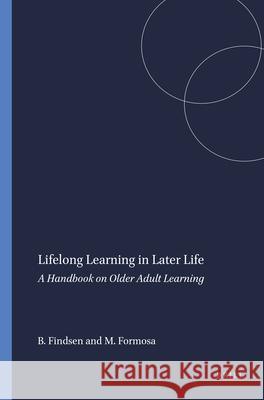Lifelong Learning in Later Life » książka
Lifelong Learning in Later Life
ISBN-13: 9789460916496 / Angielski / Miękka / 2011 / 236 str.
Lifelong Learning in Later Life
ISBN-13: 9789460916496 / Angielski / Miękka / 2011 / 236 str.
(netto: 234,73 VAT: 5%)
Najniższa cena z 30 dni: 236,46
ok. 22 dni roboczych.
Darmowa dostawa!
Lifelong learning in later life is an essential handbook for a wide range of people who work alongside older adults in varied contexts. While no single book can make claim to comprehensiveness, this interdisciplin-ary publication builds on important earlier work in lifelong learning and social gerontology, presenting a full range of perspectives on what it means to be an older learner in contemporary societies. This hand-book brings together both orthodox approaches to educational gerontology and fresh perspectives on important emerging issues faced by seniors around the globe. This book is not a "how to" manual of how to work effectively with older people for educational purposes. While it includes principles and analysis of philosophical assumptions underpinning older adult learning, its prime objective is to critically examine conventional knowledge about why, what and how older people learn. It springs from a desire to benchmark previous work, to explore new territories of learning in later life, to pose further critical questions on the significance of later life learning in formal, non-formal and informal settings. Issues discussed in this publication include the social construction of ageing, the importance of lifelong learning policy and practice, participation in later life learning, education of marginalised groups within older communities, inter-generational learning, volunteering and 'active ageing', the political economy of older adulthood, learning for better health and well-being, and the place of seniors in a learning society. Major disciplinary approaches from philosophy, psychology and sociology are complemented by historical and international perspectives. This multi-faceted handbook will provide a baseline of thinking for (critical) educational gerontology of interest to policy-makers, practitioners such as teachers, health professionals and social workers as well as students in higher education wanting to gain insight into this important and fast-growing field. The authors: Brian Findsen is a professor of adult education and director of the Waikato Pathways College at the University of Waikato, Hamilton, New Zealand. He has worked in several universities in New Zealand and was Head of Department, Adult and Continuing Education, at the University of Glasgow, 2004-2008. His writings are usually constructed within a social justice framework. His other books are The Fourth Sector: Adult and Community Education in Aotearoa New Zealand (edited with John Benseman and Miriama Scott in 1996) and Learning later (2005). Marvin Formosa is a lecturer in the European Centre for Gerontology at the University of Malta, Msida, Malta. After having completed his PhD in social gerontology in the UK, Marvin has published widely in European educational gerontology and in other areas such as ageism, social class dynamics, age discrimi-nation, older women and elder abuse. Recent and forthcoming books include Social Class Dynamics in Later Life (2009) and Social Class in Later Life: Power, Identity and Lifestyle (with Paul Higgs, 2012)."
Lifelong learning in later life is an essential handbook for a wide range of people who work alongside older adults in varied contexts. While no single book can make claim to comprehensiveness, this interdisciplin¬ary publication builds on important earlier work in lifelong learning and social gerontology, presenting a full range of perspectives on what it means to be an older learner in contemporary societies. This hand¬book brings together both orthodox approaches to educational gerontology and fresh perspectives on important emerging issues faced by seniors around the globe.This book is not a "how to" manual of how to work effectively with older people for educational purposes. While it includes principles and analysis of philosophical assumptions underpinning older adult learning, its prime objective is to critically examine conventional knowledge about why, what and how older people learn. It springs from a desire to benchmark previous work, to explore new territories of learning in later life, to pose further critical questions on the significance of later life learning in formal, non-formal and informal settings.Issues discussed in this publication include the social construction of ageing, the importance of lifelong learning policy and practice, participation in later life learning, education of marginalised groups within older communities, inter-generational learning, volunteering and active ageing, the political economy of older adulthood, learning for better health and well-being, and the place of seniors in a learning society. Major disciplinary approaches from philosophy, psychology and sociology are complemented by historical and international perspectives.This multi-faceted handbook will provide a baseline of thinking for (critical) educational gerontology of interest to policy-makers, practitioners such as teachers, health professionals and social workers as well as students in higher education wanting to gain insight into this important and fast-growing field.The authors:Brian Findsen is a professor of adult education and director of the Waikato Pathways College at the University of Waikato, Hamilton, New Zealand. He has worked in several universities in New Zealand and was Head of Department, Adult and Continuing Education, at the University of Glasgow, 2004-2008. His writings are usually constructed within a social justice framework. His other books are The Fourth Sector: Adult and Community Education in Aotearoa New Zealand (edited with John Benseman and Miriama Scott in 1996) and Learning later (2005).Marvin Formosa is a lecturer in the European Centre for Gerontology at the University of Malta, Msida, Malta. After having completed his PhD in social gerontology in the UK, Marvin has published widely in European educational gerontology and in other areas such as ageism, social class dynamics, age discrimi¬nation, older women and elder abuse. Recent and forthcoming books include Social Class Dynamics in Later Life (2009) and Social Class in Later Life: Power, Identity and Lifestyle (with Paul Higgs, 2012).











